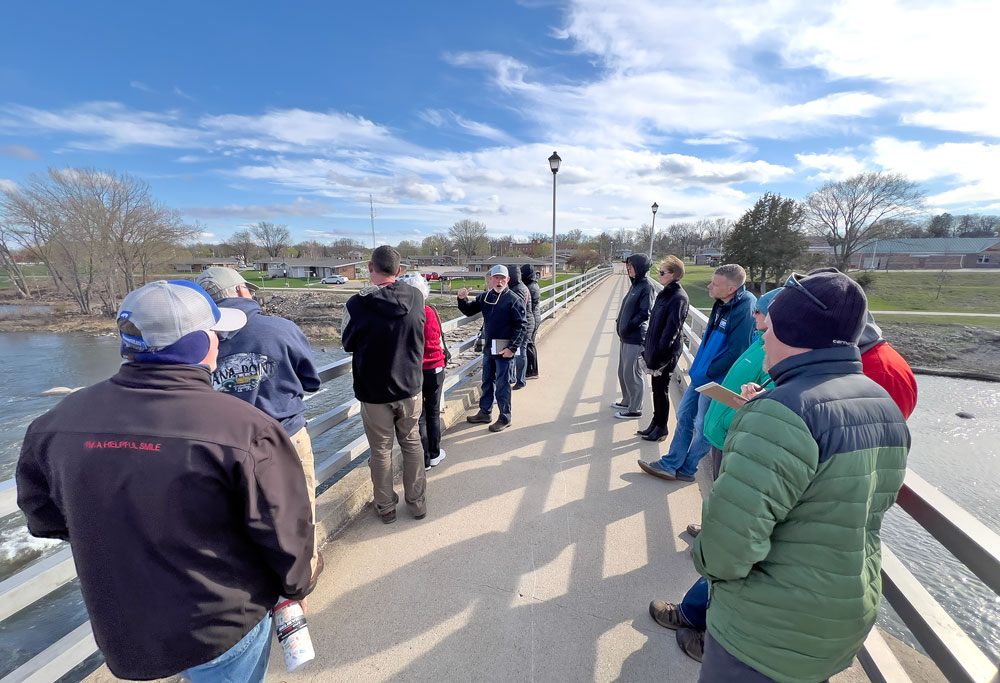County considers timing of jail project bond sales
By Bob Steenson, bsteenson@charlescitypress.com
As planning and designs for a new Floyd County law enforcement center and updates to the courthouse continue, discussion has turned to the best way to pay for those projects.
County voters already approved in May selling up to $13.5 million in general obligation bonds to finance the construction and updates, but when those bonds should be sold and in what amounts could make a difference of hundreds of thousands of dollars in interest payments.
County supervisors held a lengthy discussion Monday morning with Jeff Heil, senior vice president of public finance for Northland Securities, who has worked with Floyd County on previous bonding projects.
Heil said the county can sell bonds either as “bank-qualified” or “non-bank-qualified.”
The interest rate on bank-qualified bonds is lower than on non-bank-qualified bonds, but in order to sell bank-qualified bonds the total amount of bonds sold in a calendar year has to be less than $10 million.
Heil suggested the supervisors consider selling about $3.9 million worth of bonds yet this calendar year, then sell about $9.6 million in the next calendar year after the project’s total cost is more accurately known. That would keep the total amount sold each year below the $10 million threshold to qualify for the lower bank-qualified bond rates.
He showed an example where the county could save about $277,000 in interest payments, based on current market rates, by splitting the sales.
The county could save even more by investing the money from the sale this year until it is needed.
County Treasurer Frank Rottinghaus said the county is currently earning 2.54 percent on its short-term investments, which Heil called an excellent rate.
Another advantage of selling some bonds now is that the county would be locking in an interest rate on that portion of the financing, in case interest rates go up.
Current interest rates would allow the county to keep annual bond payments at or below the estimate that had been used to predict the impact of the bond sale on residents’ and businesses’ property taxes when the bond referendum was held, Heil said.
Of course, Heil added, interest rates could go down next year, but the general trend lately has been upward.
Supervisor Mark Kuhn brought up the possibility that had been discussed previously that the city might ask the county to also sell bonds to finance the purchase of property for a state-certified development site near the intersection of South Grand Avenue and the Avenue of the Saints for $2.156 million.
Heil said if there is a possibility the county would do that next year, then it might want to consider increasing the amount of bonds it sells for the law enforcement center and courthouse project this year to about $6 million so that the total bond sales next year would remain below the $10 million threshold.
Kuhn said he wants to make sure that doing that would not obligate the county to finance the certified site property purchase, and Heil said the two are completely unrelated, other than by the goal of keeping the county’s total bond sales each year below $10 million to qualify for lower rates.
Monday’s meeting was a planning session, so no official action could be taken, but Heil said he would begin some of the work that will be required regardless of when bonds are sold so if the county decides to go ahead with a sale this year everything will be ready.
He said the goal would be to sell the bonds before Thanksgiving, because rates tend to increase between Thanksgiving and Christmas as the end of the year nears.
The county will need to take official action at an upcoming regular meeting to set the amount of bonds to be sold this year if supervisors decide to follow that recommendation.
Also at the meeting Monday morning:
• Supervisors discussed an agreement between the county and Charles City where the county Treasurer’s Office would require payment of delinquent city parking tickets before it would issue vehicle registration renewals. The county would send the ticket payments to the city and keep $5 per ticket for its costs.
City Administrator Steve Diers, who was at the county board meeting, said the city has about 100 tickets annually that are not paid, but the cost to make efforts to collect them can be more than the $25 fine that a delinquent ticket owes.
County Treasurer Rottinghaus said his office already does similar things with the state regarding unpaid income taxes, unpaid use taxes and some court costs and fees.
The City Council has already approved an agreement with the county, and the supervisors could officially approve it at their regular meeting Tuesday morning.
• Supervisor Linda Tjaden gave an update on other aspects of the law enforcement center (LEC) and courthouse project. She said the project architects, from Prochaska & Associates, would be here next week to show a 3D model of what the exterior of the new LEC could look like, and they would have more precise cost estimates for the project now that many of the courthouse changes have been discussed.







Social Share